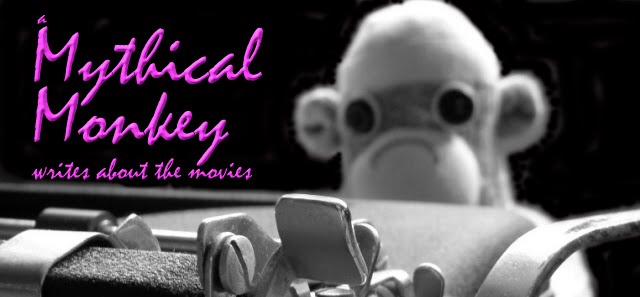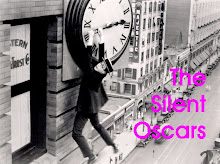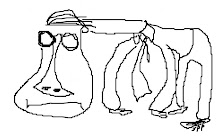 I have to confess that a movie like I Am A Fugitive From A Chain Gang, a bitter condemnation of, among other things, prison chain gangs, is not typically my sort of thing. To me, message pictures often have the taste of medicine that's supposed to be good for me but sticks halfway down—not because I necessarily disagree with what the film is saying but because the message is often delivered with all the subtlety of an ad for a personal injury lawyer.
I have to confess that a movie like I Am A Fugitive From A Chain Gang, a bitter condemnation of, among other things, prison chain gangs, is not typically my sort of thing. To me, message pictures often have the taste of medicine that's supposed to be good for me but sticks halfway down—not because I necessarily disagree with what the film is saying but because the message is often delivered with all the subtlety of an ad for a personal injury lawyer.I seem to remember Ernest Hemingway once saying something to the effect that if you tell your story about the way people really behave and if you get the details right, all the politics you'll ever need are already in it; the rest is just gilding the lily. But while art works best in the gray area that characterizes human existence, that sort of ambiguity doesn't lend itself to a clarion call to action, and unless a director is the caliber of John Ford, Sergei Eisenstein or Vittorio de Sica, he runs a real risk of burying his point if he allows his story to go where it wants to go.
 Which is what makes I Am A Fugitive From A Chain Gang such a remark- able movie in my book. Because despite clearly having an axe to grind, the film steers clear of preaching, focusing instead on the man at the center of the story and in the process delivering one of the most gripping tales to emerge from the pre-Code era.
Which is what makes I Am A Fugitive From A Chain Gang such a remark- able movie in my book. Because despite clearly having an axe to grind, the film steers clear of preaching, focusing instead on the man at the center of the story and in the process delivering one of the most gripping tales to emerge from the pre-Code era.Based on the autobiography of Robert Elliott Burns, who twice escaped from a brutal Georgia chain gang, I Am A Fugitive From A Chain Gang tells the story of James Allen (Paul Muni), a returning soldier who wants to better himself after the war, finds opportunities wanting and then is sentenced to a decade of hard labor for a robbery he didn't commit. A prison blacksmith welds manacles to his ankles and shackles them together with a chain exactly thirteen links long.
 Thus begins a life of merciless suffering at the hands of a state-sanctioned sadism that at the time passed for justice in many parts of this country. Like Marley's Ghost, wearing the chain he forged in life, Allen will remain fettered every moment of every day for the entire ten years of his sentence.
Thus begins a life of merciless suffering at the hands of a state-sanctioned sadism that at the time passed for justice in many parts of this country. Like Marley's Ghost, wearing the chain he forged in life, Allen will remain fettered every moment of every day for the entire ten years of his sentence.I won't spoil the ending for you except to say it has justly become one of the most famous in film history.
Given that the name of the movie is I Am A Fugitive From A Chain Gang, I don't think I'm giving anything away when I say that after enduring the unendurable, Allen escapes to lead the life of model citizen, only to be betrayed to the law by a gold-digging wife (Glenda Farrell). Allen agrees to return to prison on the promise that he will receive a full pardon within ninety days. What happens then I leave to you to discover, but let's say that he finds himself once again betrayed, as frankly he was betrayed when he (and millions of men) returned home from the war.
 "The state's promise didn't mean anything," he says in a moment of clarity. "It was all lies ... Why, their crimes are worse than mine, worse than anybody's here. They're the ones that should be in chains, not we!"
"The state's promise didn't mean anything," he says in a moment of clarity. "It was all lies ... Why, their crimes are worse than mine, worse than anybody's here. They're the ones that should be in chains, not we!"He's speaking of the actions of the parole board, yes, but he could just as easily be speaking of a government that had turned its back on the veterans who had served their country only to find themselves unemployed and homeless as the Depression dragged on. The film's production began just a month after President Herbert Hoover had ordered an attack on 8,000 veterans marching in favor a "bonus" bill then pending in Congress—two police officers and two veterans were killed—and the full meaning of Allen's words would not have been lost on an audience of the time.
 Such a story could easily have become either shrill and histrionic or unbearably grim if the director or actors had strayed too far in one direction or the other. That it is instead enthralling from beginning to end is a testament to both Mervyn LeRoy's expert direction and to Paul Muni's pitch-perfect performance.
Such a story could easily have become either shrill and histrionic or unbearably grim if the director or actors had strayed too far in one direction or the other. That it is instead enthralling from beginning to end is a testament to both Mervyn LeRoy's expert direction and to Paul Muni's pitch-perfect performance. LeRoy, who is best known now as the guy who green-lighted The Wizard Of Oz, chose both by design and by circumstance to let sound and images tell much of his story. The sound of clanking chains are more eloquent than a page of dialogue, and when you see that even the mules are chained together, you know you're bearing witness to a justice system founded on the most inhuman sort of cruelty. That censorship forced the studio to remove some of the more incendiary dialogue explicitly condemning chain gangs actually improved the movie—without unctuous, oily speeches to get in the way, the images speak for themselves, and speak powerfully.
LeRoy, who is best known now as the guy who green-lighted The Wizard Of Oz, chose both by design and by circumstance to let sound and images tell much of his story. The sound of clanking chains are more eloquent than a page of dialogue, and when you see that even the mules are chained together, you know you're bearing witness to a justice system founded on the most inhuman sort of cruelty. That censorship forced the studio to remove some of the more incendiary dialogue explicitly condemning chain gangs actually improved the movie—without unctuous, oily speeches to get in the way, the images speak for themselves, and speak powerfully.But primarily, I Am A Fugitive From A Chain Gang works because we come to care about the man underneath the story, the man played by Paul Muni.
Muni was born Meshilem Meier Weisenfreund of Polish-Jewish decent in what is now Lviv, Ukraine. In 1902, at the age of seven, he immigrated to the United States with his parents and came of age in New York. Muni learned the craft of acting in what was then known as "the Yiddish theater," and because he was so skilled at the art of makeup, he was dubbed "the New Lon Chaney."
 Despite being nominated for an Oscar, Muni's first screen performance, 1929's The Valiant, was a box office failure. When his second film was also a flop, Muni returned to the Broadway stage and didn't make another movie until writer Ben Hecht recommended him for the lead in Howard Hawks's gangster classic, 1932's Scarface. When he followed that box office smash with an Oscar-nominated performance in I Am A Fugitive From A Chain Gang, his Hollywood career was set. In the course of a career that ran until his retirement in 1959, he was nominated for four more Oscars, winning in 1936 for The Story Of Louis Pasteur.
Despite being nominated for an Oscar, Muni's first screen performance, 1929's The Valiant, was a box office failure. When his second film was also a flop, Muni returned to the Broadway stage and didn't make another movie until writer Ben Hecht recommended him for the lead in Howard Hawks's gangster classic, 1932's Scarface. When he followed that box office smash with an Oscar-nominated performance in I Am A Fugitive From A Chain Gang, his Hollywood career was set. In the course of a career that ran until his retirement in 1959, he was nominated for four more Oscars, winning in 1936 for The Story Of Louis Pasteur.Today, opinions about Muni's abilities are split, with many critics echoing British film historian David Thomson who calls Muni "awful" and "a crucial negative illustration in any argument as to what constitutes screen acting." Me, I'd call him "theatrical"—he worked like a Method actor, immersing himself in a role, but he learned his technique on the Broadway stage and despite years in Hollywood, never strayed far from his origins.
But does that make him, as Thomson and others contend, a bad movie actor?
 Well, Muni's acting reminds me of something that Katie-Bar-The-Door was reading about wine in the Washington Post Magazine a couple of weekends ago, that a wine that tastes good when you're sipping it on the back porch won't necessarily taste good when you're drinking it with a meal. Turns out the flavors in the wine when combined with, say, red meat create a different sensation on your taste buds than they do when combined with peanuts at a cocktail party. Doesn't mean there's anything wrong with the wine. Just means that there's no simple one-size-fits-all way to rate a bottle of wine.
Well, Muni's acting reminds me of something that Katie-Bar-The-Door was reading about wine in the Washington Post Magazine a couple of weekends ago, that a wine that tastes good when you're sipping it on the back porch won't necessarily taste good when you're drinking it with a meal. Turns out the flavors in the wine when combined with, say, red meat create a different sensation on your taste buds than they do when combined with peanuts at a cocktail party. Doesn't mean there's anything wrong with the wine. Just means that there's no simple one-size-fits-all way to rate a bottle of wine. In the same way, there's no one-size-fits-all way to rate acting either. And to insist that the only good acting is realistic, underplayed Method acting is like saying the only good wine is a Bordeaux, whether you're drinking it with beef, fish or a blonde in the backseat of a Thunderbird. I wouldn't want to see Paul Muni in Schindler's List—but then neither would I want to see Robert De Niro in Duck Soup, Marlon Brando in It's A Wonderful Life or Dustin Hoffman in High Noon. Context is everything, or nearly so, and I can't imagine any of Muni's contemporaries in the role of James Allen—Cagney was too gleeful, Robinson too menacing, despair wasn't in Cooper's make-up and I don't believe Gable could have been pushed around by anybody.
In the same way, there's no one-size-fits-all way to rate acting either. And to insist that the only good acting is realistic, underplayed Method acting is like saying the only good wine is a Bordeaux, whether you're drinking it with beef, fish or a blonde in the backseat of a Thunderbird. I wouldn't want to see Paul Muni in Schindler's List—but then neither would I want to see Robert De Niro in Duck Soup, Marlon Brando in It's A Wonderful Life or Dustin Hoffman in High Noon. Context is everything, or nearly so, and I can't imagine any of Muni's contemporaries in the role of James Allen—Cagney was too gleeful, Robinson too menacing, despair wasn't in Cooper's make-up and I don't believe Gable could have been pushed around by anybody.So Muni it was, and he was perfect in the role. He tailored his acting to the needs of the moment; when the scene needed energy, he was animated; when the scene spoke for itself, he was absolutely still. And when it was time for him to explode, it was the explosion of a man who had swallowed his rage at an unjust system until he was choked with near madness.
 That he was perfect in other roles, too (Howard Hawks's Scarface comes immediately to mind), is enough to establish him in my mind as a real actor worthy of our attention.
That he was perfect in other roles, too (Howard Hawks's Scarface comes immediately to mind), is enough to establish him in my mind as a real actor worthy of our attention.I Am A Fugitive From A Chain Gang was a sensation upon its release, winning the National Board of Review's prize as best picture of the year, as well as three Oscar nominations (picture, actor and sound recording).
More important to Warner Brothers, the studio that had gambled on such risky material, the film was a big hit at the box office. Despite pioneering sound movies, Warner Brothers was considered a second-tier studio in 1932, with their fast, hard gangster pictures and sensational Code-skirting movies confined largely to working-class urban venues where patrons had little disposable income. To break into the high-rent districts where the nicer independent theaters were located, Warners needed a "prestige" project and I Am A Fugitive From A Chain Gang fit the bill perfectly—a case of art serving the ends of commerce.
In 1991, the Library of Congress added I Am A Fugitive From A Chain Gang to the National Film Registry as being "culturally, historically, or aesthetically significant."






2 comments:
Don't feel the need to apologize for Muni or for liking him. He would have been my #1 for 32-33 were I not so beholden to "Oscar eligibility" and going with Peter Lorre for M. His performance in Chain Gang is phenomenal, as was his performance in Scarface.
I would rather take Muni's theatricality over the understated performances of Spencer Tracy or Gary Cooper any day.
He would have been my #1 for 32-33 were I not so beholden to "Oscar eligibility" and going with Peter Lorre for M.
Back before my Mythical Monkey days when I was doing alternate Oscars based on strict Oscar eligibility, my 1932-33 winners included M, Peter Lorre and Fritz Lang. Which is no knock on King Kong or Duck Soup, just a reflection of how great M really is.
Post a Comment